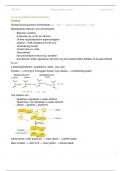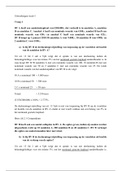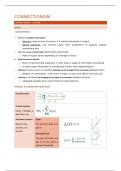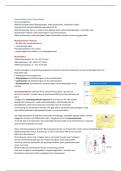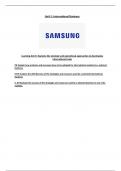Auditing
Lecture 1:
Video: Auditing lecture 1
Introduction to Auditing & Assurance
What Is An Assurance Engagement?
“An engagement in which a practitioner aims to obtain sufficient appropriate evidence in order to
express a conclusion designed to enhance the degree of confidence of the intended users other than
the responsible party about the subject matter information.”
- International Auditing and Assurance Standards Boards (IAASB) / International Standard on
Assurance Engagements (ISAE 3000 Revised)
- financial statement audit is an example of assurance engagement
Assurance, Attestation and Direct Engagements
The above are all assurance engagements:
→ we split them in Direct Engagements and Attestation services
Attestation Services:
- The accountable party (the board) measures the subject matter using appropriate criteria
- split in Audits and Reviews
- Audit: the auditer issues a high level of assurance
- Review: the auditer gives a limited level of assurance
Direct Engagements:
- Practioner (auditers) measures or evaluates the underlying subject matter against the applicable
criteria.
Most important subject matter we discuss is the financial statements
, Auditing
Financial Statements Audits
Objective of an Audit of Financial Statements
To enhance the degree of confidence of intended users in the financial statements.
This is achieved by the expression of an opinion by the auditor on whether the financial statements
are prepared, in all material respects, in accordance with an applicable financial reporting
framework. In the case of most general purpose frameworks, that opinion is on whether the
financial statements are presented fairly, in all material respects, or give a true and fair view in
accordance with the framework. An audit conducted in accordance with ISAs and relevant ethical
requirements enables the auditor to form that opinion. - ISA 200
Parties to an Audit Engagement
Explaining Assurance Practices (why do they deliver assurance)
Conditions:
• Information risk
- Information may be false, biased, inaccurate, irrelevant, incomplete
• Consequences
- Can impact shareholders, borrowers, suppliers, customers, etc.
• Complexity
- Complex transactions & valuations, summarizing data, etc.
• Remoteness
- Lack of expertise, time and access
Modern Auditing
- The need for capital increased beyond the combined resources of the owners of companies
o Increased reliance on external financing (debt + equity)
o Separation management and ownership
- First professional body (Society of Accountants) was founded in Edinburgh in 1853
- US – Securities and Exchange Commission (SEC): Securities Act of 1934 requires “certification” of
financial statements
- Netherlands (2019):
• 12,099 audits of PIEs
• 7,771 audits of non-PIEs
• 15,510 CPAs in 2018 (4,548 active in public audits)
Big four: Deloitte, PWC, EY, KPMG
The Value of an Audit
- Demand comes from regulation (exogenous) and from within the economy (endogenous)
- Value depends on public confidence in the competence and independence of the auditor
, Auditing
Origin of Economic Demand
- Agency theory: the stewardship (monitoring) hypothesis
- Information hypothesis
- Insurance (deep pockets) hypothesis
Agency theory:
- Producers are agents (stewards) of capital providers, who are principals.
- Example: managers of public companies “work” for shareholders, hence managers are agents
and shareholders are principals.
Underlying Assumptions about People
- Everyone maximizes his or her own self-interest.
- Everyone has “rational expectations” (i.e., has perfect judgment and foresight)
Underlying Assumptions about Work
- Agents (managers) require compensation to work hard.
- Agents (managers) tend to shirk (not work hard) because principals (shareholders) cannot readily
monitor their work levels.
→ Conflict of Interest
Now the Perfect Foresight Comes into Play
- Anticipating agents’ shirking, principals propose to reduce the amount of compensation given to
agents.
- Anticipating principals’ compensation reduction proposal, agents make assertions and hire
attesters.
o Attesters give principals comfort that agents are working hard.
- Hence assurance demand arises endogenously (from within the market system)
- Audits reduce adverse selection and moral hazard between managers and capital providers
The Information Hypothesis
Benefits of reliable information:
- Reduction of Risk (estimation error)
• Lower risk premium
- Improvement of (internal) decision making
• Finding errors, improve internal accounting & decision making
The Insurance Hypothesis
Demand for audits:
- Normal conduct: absence of audit may signal negligence or fraud on behalf of management
- In-house general counsels
• Liability protection to clients
- Reputation protection by auditors
- Deep pockets theory
, Auditing
Video: Kausar, Shroff and White 2016
Kausar, Shroff and White (JAE, 2016) – Real effects of the audit choice
Voluntary audits, can serve as a signal or screening mechanism, which gives us information about the
riskiness of a company
Relevance:
- Audits increase the quality and reliability of financial statement disclosures
This means that reporting quality is higher for companies with a financial statement audit, than
for companies without an audit.
→ Because an audit reduce the information asymmetry and cost of capital (verification effect)
- Authors argue that the choice to obtain an audit can provide incremental information (about the
riskiness of a company) to creditors:
• Provides insight into the future prospects of the company
• Audits are costly, so it is expected that firms only choose to be audited voluntarily if the
benefits outweigh the costs
- Many companies are subject to mandatory audits, so impossible to study impact of voluntary
audit choice. But, the UK increased audit exemption thresholds in 2004, many companies were
no longer required to have an audit
- This study empirically tests the impact of audit choice on financing frictions. They believed that
relaxing financing frictions should result in better investment efficiency and higher future
Hypothesis development:
Verification benefit of audit reducing financing frictions (e.g., adverse selection, moral hazard),
improving resource allocation and contracting efficiency
• Leads to increased credibility of financial statement disclosures
Likely that voluntary decision to be audited conveys incremental information to external
stakeholders
- Signaling theory:
o Firm wants to signal that it is a high quality investment
o Only credible if it is a costly signal
o this means that firms will only spend money on audit if they expect to reap (greater)
benefits in the future (benefits outweigh the costs)
- Screening literature:
o External financers may require an audit to see if firm can withstand an audit (test)
o Low quality firms will not choose to undergo a costly audit, because risk of failing audit is
too high
Hypothesis: A firm’s choice to voluntarily obtain an audit provides information about the firm's
future prospects that reduces financing frictions, leading to an increase in debt and investment.
Setting:
- United Kingdom: Concerns that audits created disproportionally high costs for small companies
- 1994: Private companies are not required to be audited if sales were below £1m and assets did
not exceed £1.4m
- Amendment to companies act:
• Companies with fiscal years ending after January 30, 2004 were allowed to opt-out of an audit
if: sales did not exceed £5.6m and assets did not exceed £2.8m
Lecture 1:
Video: Auditing lecture 1
Introduction to Auditing & Assurance
What Is An Assurance Engagement?
“An engagement in which a practitioner aims to obtain sufficient appropriate evidence in order to
express a conclusion designed to enhance the degree of confidence of the intended users other than
the responsible party about the subject matter information.”
- International Auditing and Assurance Standards Boards (IAASB) / International Standard on
Assurance Engagements (ISAE 3000 Revised)
- financial statement audit is an example of assurance engagement
Assurance, Attestation and Direct Engagements
The above are all assurance engagements:
→ we split them in Direct Engagements and Attestation services
Attestation Services:
- The accountable party (the board) measures the subject matter using appropriate criteria
- split in Audits and Reviews
- Audit: the auditer issues a high level of assurance
- Review: the auditer gives a limited level of assurance
Direct Engagements:
- Practioner (auditers) measures or evaluates the underlying subject matter against the applicable
criteria.
Most important subject matter we discuss is the financial statements
, Auditing
Financial Statements Audits
Objective of an Audit of Financial Statements
To enhance the degree of confidence of intended users in the financial statements.
This is achieved by the expression of an opinion by the auditor on whether the financial statements
are prepared, in all material respects, in accordance with an applicable financial reporting
framework. In the case of most general purpose frameworks, that opinion is on whether the
financial statements are presented fairly, in all material respects, or give a true and fair view in
accordance with the framework. An audit conducted in accordance with ISAs and relevant ethical
requirements enables the auditor to form that opinion. - ISA 200
Parties to an Audit Engagement
Explaining Assurance Practices (why do they deliver assurance)
Conditions:
• Information risk
- Information may be false, biased, inaccurate, irrelevant, incomplete
• Consequences
- Can impact shareholders, borrowers, suppliers, customers, etc.
• Complexity
- Complex transactions & valuations, summarizing data, etc.
• Remoteness
- Lack of expertise, time and access
Modern Auditing
- The need for capital increased beyond the combined resources of the owners of companies
o Increased reliance on external financing (debt + equity)
o Separation management and ownership
- First professional body (Society of Accountants) was founded in Edinburgh in 1853
- US – Securities and Exchange Commission (SEC): Securities Act of 1934 requires “certification” of
financial statements
- Netherlands (2019):
• 12,099 audits of PIEs
• 7,771 audits of non-PIEs
• 15,510 CPAs in 2018 (4,548 active in public audits)
Big four: Deloitte, PWC, EY, KPMG
The Value of an Audit
- Demand comes from regulation (exogenous) and from within the economy (endogenous)
- Value depends on public confidence in the competence and independence of the auditor
, Auditing
Origin of Economic Demand
- Agency theory: the stewardship (monitoring) hypothesis
- Information hypothesis
- Insurance (deep pockets) hypothesis
Agency theory:
- Producers are agents (stewards) of capital providers, who are principals.
- Example: managers of public companies “work” for shareholders, hence managers are agents
and shareholders are principals.
Underlying Assumptions about People
- Everyone maximizes his or her own self-interest.
- Everyone has “rational expectations” (i.e., has perfect judgment and foresight)
Underlying Assumptions about Work
- Agents (managers) require compensation to work hard.
- Agents (managers) tend to shirk (not work hard) because principals (shareholders) cannot readily
monitor their work levels.
→ Conflict of Interest
Now the Perfect Foresight Comes into Play
- Anticipating agents’ shirking, principals propose to reduce the amount of compensation given to
agents.
- Anticipating principals’ compensation reduction proposal, agents make assertions and hire
attesters.
o Attesters give principals comfort that agents are working hard.
- Hence assurance demand arises endogenously (from within the market system)
- Audits reduce adverse selection and moral hazard between managers and capital providers
The Information Hypothesis
Benefits of reliable information:
- Reduction of Risk (estimation error)
• Lower risk premium
- Improvement of (internal) decision making
• Finding errors, improve internal accounting & decision making
The Insurance Hypothesis
Demand for audits:
- Normal conduct: absence of audit may signal negligence or fraud on behalf of management
- In-house general counsels
• Liability protection to clients
- Reputation protection by auditors
- Deep pockets theory
, Auditing
Video: Kausar, Shroff and White 2016
Kausar, Shroff and White (JAE, 2016) – Real effects of the audit choice
Voluntary audits, can serve as a signal or screening mechanism, which gives us information about the
riskiness of a company
Relevance:
- Audits increase the quality and reliability of financial statement disclosures
This means that reporting quality is higher for companies with a financial statement audit, than
for companies without an audit.
→ Because an audit reduce the information asymmetry and cost of capital (verification effect)
- Authors argue that the choice to obtain an audit can provide incremental information (about the
riskiness of a company) to creditors:
• Provides insight into the future prospects of the company
• Audits are costly, so it is expected that firms only choose to be audited voluntarily if the
benefits outweigh the costs
- Many companies are subject to mandatory audits, so impossible to study impact of voluntary
audit choice. But, the UK increased audit exemption thresholds in 2004, many companies were
no longer required to have an audit
- This study empirically tests the impact of audit choice on financing frictions. They believed that
relaxing financing frictions should result in better investment efficiency and higher future
Hypothesis development:
Verification benefit of audit reducing financing frictions (e.g., adverse selection, moral hazard),
improving resource allocation and contracting efficiency
• Leads to increased credibility of financial statement disclosures
Likely that voluntary decision to be audited conveys incremental information to external
stakeholders
- Signaling theory:
o Firm wants to signal that it is a high quality investment
o Only credible if it is a costly signal
o this means that firms will only spend money on audit if they expect to reap (greater)
benefits in the future (benefits outweigh the costs)
- Screening literature:
o External financers may require an audit to see if firm can withstand an audit (test)
o Low quality firms will not choose to undergo a costly audit, because risk of failing audit is
too high
Hypothesis: A firm’s choice to voluntarily obtain an audit provides information about the firm's
future prospects that reduces financing frictions, leading to an increase in debt and investment.
Setting:
- United Kingdom: Concerns that audits created disproportionally high costs for small companies
- 1994: Private companies are not required to be audited if sales were below £1m and assets did
not exceed £1.4m
- Amendment to companies act:
• Companies with fiscal years ending after January 30, 2004 were allowed to opt-out of an audit
if: sales did not exceed £5.6m and assets did not exceed £2.8m


